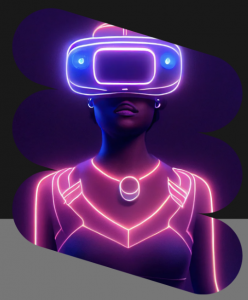Exploring the future of immersive transformation
- Dates: Asynchronous online: June 3-July 7, 2024 | In-Person: July 8-12, 2024 | Asynchronous online: July 15-26, 2024
- Instructor: Dr. Keri Ewart
- Location: Virtual (synchronous and asynchronous) and in-person on the UBC Vancouver campus
- Please note: students must have already completed ETEC 500 to take a MET Summer Institute

Extended Realities (XR) emergence as an educational innovation combined with its ability to draw upon a number of foundational learning theories have made Virtual Reality (VR), Augmented Reality (AR), and Mixed Reality (MR) technology a compelling platform to facilitate learning experiences across a wide range of contexts, sectors, and subject matter. Immersive Reality (IM) interventions in educational environments, medical fields, and with instructional design contexts utilize reality-blending design tools, and engaging VR games have demonstrated XR’s ability to develop empathy, insight, deep and critical learning and skill development, and engagement across the cultural landscape.
XR presents users with a highly immersive and interactive platform, creating a sense of presence that allows for profoundly memorable experiential learning environments (Peralman, 2021). Extended Realities (XR) move beyond mere “visualization” to offer a more transformative “perceptualization” that can engage any of the human senses (McLellan, 2001). VR uniquely affords embodiment to learners by transforming body, location, ability, and behaviour (Scavarelli et al., 2020). With the infusion of artificial intelligence, learners can use immersive design tools to build expressions of their knowledge and imagination through computational simulations, improved preprocedural planning, real-time decision making, and critical and creative skill development (Chalmers, 2022). Ultimately, XR technologies blur the line between user interface devices and assistive technologies by both improving accessibility for differently abled users and levelling the interactive playing field (Fox & Thornton, 2022).
With XR pedagogy grounded in cognitive, behaviourist, constructivist, constructionist, socialist, connectivist, experiential, situated, and spacemaker theories, learners will engage in participatory cultures, while engaged in immersive activities to bridge theory with their unique practice context. By researching, conceptualizing, prototyping, designing, and evaluating, candidates will investigate the history, affordances, and considerations involved with immersive technologies for the purpose of immediate and effective implementation in their own learning environments. XR design and development will encourage candidates to develop multiliterate and multimodal skills and view learning from game-based, ecological psychology, and simulative perspectives. Artificial Intelligence will be an important discourse in the investigation of Immersive Technologies within this course. Through the examination of algorithmic bias and injustice, to equity and accessibility, to design, capabilities, implementations, effective and immediate uses of artificial intelligence, and next steps, candidates will be afforded plenty of opportunities to experience the immersive qualities of the latest XR technologies, explore novel educational applications of XR, understand the importance of a learner-centered approach to XR design, and become an XR creator.
In this course, learners will be exposed to many extended and mixed reality applications including Unity, Unreal Engine, ARCore, Hololink, VR Maker, Vuforia Studios, and many more through the use of VR/AR devices such as Oculus Quest 2, Google Cardboards, Lenovo ThinkReality A3, Vive, Microsoft HoloLens, etc. You do not need to be a developer or programmer to take this course and in fact, no VR and AR experience is necessary. In this
summer intensive you will transform your learning, pedagogy/andragogy, and understanding about AI and XR while being equipped with the skills you need to feel confident in implementing and creating AR and VR in your own learning environment.